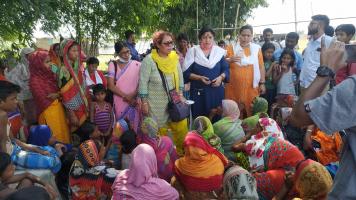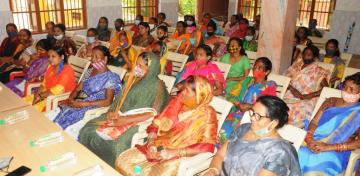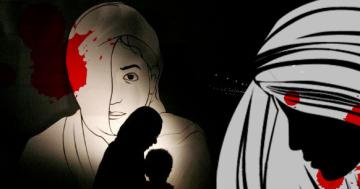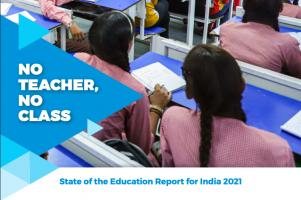From its very inception in 1981, AIDWA has had a very clear understanding about Communalism. It has recognized communalism as a way of not only dividing women and the working people but also as something that strengthens religious identities and regressive beliefs that are justified in the name of religion. All sorts of patriarchal notions, anti-women laws and a plethora of anti-women customs are promoted and re-invented in the name of religion. Communalism, therefore, is not only responsible for promoting hatred between communities and often inflicting violence on the most vulnerable sections of minorities, especially women and children, but within communities it acts against movements for gender justice, promotion of scientific values and rejection of all rituals and beliefs that are anti-women. In most religious scriptures, women are relegated to a subordinate status, their domestic roles and roles as mothers and care-givers are glorified, submissiveness is considered their greatest virtue and women who are assertive with their rights and equality are condemned in the strongest language. As communal polarization deepens and religious identities are strengthened, women’s rights and women’s equality in all spheres comes under increasing attack.
From its very inception in 1981, AIDWA has had a very clear understanding about Communalism. It has recognized communalism as a way of not only dividing women and the working people but also as something that strengthens religious identities and regressive beliefs that are justified in the name of religion. All sorts of patriarchal notions, anti-women laws and a plethora of anti-women customs are promoted and re-invented in the name of religion. Communalism, therefore, is not only responsible for promoting hatred between communities and often inflicting violence on the most vulnerable sections of minorities, especially women and children, but within communities it acts against movements for gender justice, promotion of scientific values and rejection of all rituals and beliefs that are anti-women. In most religious scriptures, women are relegated to a subordinate status, their domestic roles and roles as mothers and care-givers are glorified, submissiveness is considered their greatest virtue and women who are assertive with their rights and equality are condemned in the strongest language. As communal polarization deepens and religious identities are strengthened, women’s rights and women’s equality in all spheres comes under increasing attack.
It is not a co-incidence, therefore, that the sex ratio between women and men and more so between infant girls and boys has seen a steady decline in the same period that has witnessed growing communal polarization and the onset of neo-liberal reforms. It is important to understand that the success of the neo-liberal project depends a lot on this polarization as also caste-polarization so that opposition to the inequality, unemployment and pauperization that it causes is rendered divided and ineffective.
Beware of communal interpretations:
On the basis of the AIDWA understanding of communalism, our interventions have been of various kinds. The first has been to introduce clarity on this issue among our own cadres and members. How essential this task does not need an explanation but there is a widespread illusion that all those who join an organization which is left-oriented and which is committed to the emancipation of all women will naturally be secular in their outlook. Communal prejudices and communal ways of looking at and interpreting events and problems are very complex and deeply embedded. The way that history is taught and understood, for example, illustrates this point. Most Indians learn history from conversations around them, from religious discourses, from badly brought out history books taught by ill-trained teachers and, very importantly, from the guides who show them around places of historical interest. Apart from all this, the importance of teaching a communal interpretation of history has been understood by all ruling classes including the British. It was they who divided Indian history into periods defined by religion or by the religion of the ruling classes at the time: Hindu Period, Muslim/Mughal period and Modern history in which the religion, Christianity, of the rulers remains unstated but very much at the heart of the historiography promoted by the British. It is not surprising, therefore, that a communal approach to the past and the present becomes part of the consciousness of millions of Indians. (A Casteist approach is present in the same way and members of minority communities are brought up with their own set of prejudices and communal interpretations.) The task of developing a secular approach and a rejection of various levels of prejudice among our own members and cadres is therefore not an easy one. Not only do we hold innumerable discussions in large and small groups at every level where a frank expression of ideas and beliefs is encouraged, but the organization has also brought out booklets in a Q&A format which have been widely distributed, read and discussed both within the organization and outside and which have also been translated into all the State languages. These booklets are written in very simple language and address both majority and minority communalism.
Communalization of textbooks and education is also an issue that is regularly discussed within the organization. AIDWA has also included reports on this in its publications and resolutions.
Interventions in conflicts:
In addition to this, AIDWA has tried to intervene in times of communal conflict. This has been done in two ways. When a small or big conflict breaks out in an area or a town or city, if there are AIDWA units in the area, they are encouraged to meet the women of both communities. They try to convince them to keep out of the fray and, if possible, make every attempt to bring them together. After normalcy is established, AIDWA members try to bring women of both communities who maybe living in the same area or town or village to joint meetings. They are encouraged to speak about what they feel are the reasons behind the conflict. Various methods are adopted to re-unite them or to bring them closer to each other. If possible, they are made members of the organization. It must be admitted, however, that such attempts at direct intervention are very few. Often, such conflicts occur where AIDWA is non-existent for example in most parts of Gujarat, in Western UP, in Kandhamal (Orissa). Or the unit maybe very weak. Or the polarization maybe so extreme that it is not possible for women to make their voices heard. Unfortunately, more and more women are deliberately being targeted by communal forces. In many places not only are they becoming aggressive and vocal against the other community but they are also being seen as participants in violence. When men of their community are arrested or charged with rape, arson, murder etc. they are easily mobilized into forming angry mobs protesting against this and demanding that no action be taken. Of course, these phenomena are restricted for the most part to women of the majority community. In these situations, our interventions are reduced to mere formalities and it is essential that we intensify our efforts in a much more serious, self-critical and planned manner.
In order to do this, it is important to review our ealier interventions. There is much that needs to be taken forward and also new directions that need to be explored.
In States like Kerala and West Bengal where our organization is extremely wide and deep in its reach, our local units have responded immediately to communal propaganda and provocation. We find that as far back as 1983, our units in Quilon responded to tension being created by a church being constructed near a temple by going house to house in the area, defusing the situation and re-establishing peace. In the same way, in West Bengal, for decades our members and leaders were able to respond positively and successfully to every small and big attempt to fan communal hatred and conflict. In Delhi, our unit was extremely active in relief work after the anti-Sikh pogrom of 1984. Work in the rehabilitation colonies was also extremely important at the time. From that time till the present, our Delhi units have tried to intervene whenever attacks on Muslims in various slums and areas of the Old City have been carried out. They have been successful in averting clashes on several occasions. In Maharashtra, our Pune and Solapur sisters have made brave and positive contributions to maintaining communal harmony among poor women in slum areas despite huge provocation. In Kanpur, too, our members have come to the rescue of Muslim women and their families during riots. In many other States, Rajasthan, Tamil Nadu, Karnataka, Haryana, MP, Bihar and Orissa, our units have been active in collecting relief materials for riot victims.
In a State like Gujarat where our unit is extremely weak, our members in Ahmedabad and Bhavnagar displayed tremendous energy and courage in maintaining peace in a few areas where we had members belonging to both communities.
AIDWA has done pioneering work in visiting riot-affected areas and presenting reports on the reasons for the rioting, the plight of the victims and suggestions for the future. It is important to mention a few of these. In 2002, the AIDWA delegation was the first to reach Gujarat and its report was significant for many reasons. It was the first report that gave an eye-witness description of the bogies still standing at the Godhra station that had caught fire on that fateful morning of the 27th of February. The report makes it very clear that there was incendiary material like kerosene, stoves, grain etc. inside the compartment that had caught fire and that there was no evidence of burning on the outside of the compartment. The delegation was also able to meet and interview Bilquis Bano in the Godhra camp and helped to ensure that the clothes that she was wearing when she was gang-raped were kept in safe custody and produced as evidence. The report is a horrific indictment of communal politics and the havoc that they wreak.
The AIDWA delegation to Kandhamal also presented an early and insightful report. The delegation presented many of its findings to the Chief Minister on its return and some of its suggestions were immediately accepted. These included supply of cloth to women victims in camps and provision of Braille books to a blind girl victim.
During the recent Muzaffarnagar riots in Western UP also AIDWA sent a fact-finding delegation which gave very important information regarding gang rapes that had taken place.
In August, 2014, an AIDWA delegation met with a young woman from Shamli district who had filed a case alleging abduction and forced conversion to Islam and forced marriage with a Muslim rapist. The press reports of this ‘case’ were highly incendiary and had created an explosive situation in the area. The delegation met the victim and her family members and gave an extremely cautious report saying that the truth was not what was being reported and that all attempts to foment tension should be dealt with very stringently. Later, the ‘victim’ herself gave a statement that she had married a Muslim of her choice, that she wanted to live with him and that she had been cruelly pressurized to make false statements. It was also revealed that a BJP activist had paid her father 25,000/-.
AIDWA has, therefore, made important interventions wherever major communal conflicts have occurred; it has tried to tackle this issue at various levels; its units have directly intervened to stop clashes and restore unity wherever this has been at all possible and have all tried to collect and distribute relief materials to victims. AIDWA has also made attacks on communalism an intrinsic part of all its campaigns and struggles.
The situation today is more dangerous than ever. AIDWA members are very conscious of this and are determined to renew and strengthen their efforts to unify women at all levels, through struggles and campaigns.






